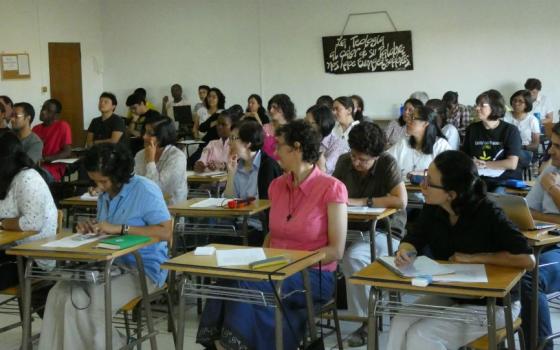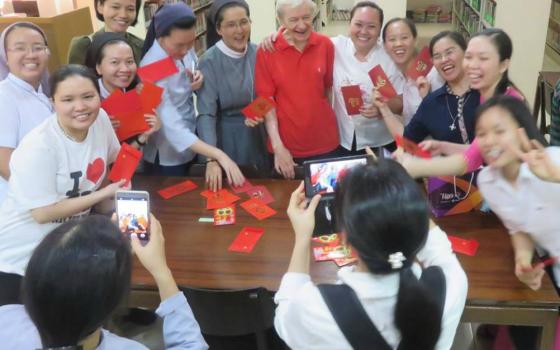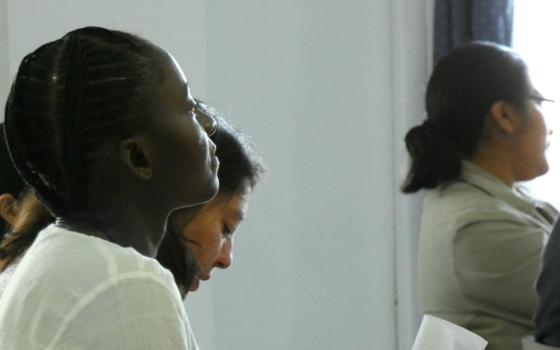This month, the panelists gave us an insight into the education of sisters around the world. One thing they all agree upon: Education is the highest priority in terms of preparing their sisters for ministry. However, sisters question the adequacy of education for women religious in different parts of the world. We learned all this as the panel responded to the following questions:
How successful is your congregation at attending to the educational needs of its sisters? In what way is your congregation participating in the ongoing education of sisters from around the globe?
______
 Immaculata Chukwunyere is a member of the Congregation of the Handmaids of the Holy Child Jesus. She was a headmistress and teacher in Nigeria and Kenya before moving to the United States in 1999. She now teaches high school English.
Immaculata Chukwunyere is a member of the Congregation of the Handmaids of the Holy Child Jesus. She was a headmistress and teacher in Nigeria and Kenya before moving to the United States in 1999. She now teaches high school English.
Every congregation understands the importance of education in living out its charism. Most congregations of women religious commit to educating their members not only as a way of witnessing, but also as a means of upholding and expanding their charism and ministries.
Nevertheless, sometimes environmental and cultural factors affect the level of importance some congregations attach to the education of their members. This might limit the education of some sisters to basic training in conformity and neglects the critical education needed to engage in mission-building and interpretation of the signs of the times — a type of education that comes from schooling beyond basic formation in institutional mission and charism.
Education encompasses not only training in manners and mental habits but creates awareness in critical thinking and problem-solving.
Critical education creates inquirers: analytic, creative, reflective thinkers and risk-takers who can become agents of social change. Education should cause a fundamental change in mindset, unlocking the doors to self-appreciation and an appreciation of the culture, histories, values and traditions of others and equipping the learner with tools for global interaction and collaboration.
This high level of functioning does not always come from basic education; it is best developed and nurtured through a rigorous curriculum of higher education.
To fully appreciate emerging trends in religious life and adapt the charism to the signs of the times, knowledge as well as creative thinking are required. These do not happen by fiat.
As members of the universal church and global community, it is unfortunate that some religious communities do not have the financial strength to give every one of their members access to higher education.
Just as the people we serve advance in learning, sisters need to be better prepared to minister to that emerging new population. To bridge this gap, some congregations in Africa are partnering with communities in the developed world to provide higher education to their sisters through scholarships and live-in programs.
In fidelity to our charism, our sisters receive education according to their ability and the demands of the apostolate. We also take advantage of scholarship offers from women religious congregations in the United States and Europe as well as that of the African Sisters Education Collaborative program to educate our sisters.
Through the benevolence of the Sisters of Mercy of Omaha, Nebraska, some of our sisters, including me, have had the privilege of higher education. The knowledge we gained not only improved our ability to witness, but also gave us tools to expand our charism and ministries to meet the signs of the times.
 Helen Graham is a Maryknoll sister and a native of Brooklyn, New York, who has lived in the Philippines for 50 years. At the Institute of Formation and Religious Studies in Quezon City, she teaches sacred Scripture and mentors students from across Asia, Africa and Latin America.
Helen Graham is a Maryknoll sister and a native of Brooklyn, New York, who has lived in the Philippines for 50 years. At the Institute of Formation and Religious Studies in Quezon City, she teaches sacred Scripture and mentors students from across Asia, Africa and Latin America.
Noting that sisters did not have near the level of theological and scriptural education necessary for their formation or their ministries, the Association of Major Superiors of Women of the Philippines founded the Sister Formation Institute (SFI) in the midst of the Second Vatican Council.
Maryknoll Sr. David Marie was involved, along with a Jesuit, in the very beginnings of SFI, which at that time provided a one-year program of basic theological and scriptural education for young sisters in formation. The school did not begin a degree program until 1990, when SFI became the Institute of Formation and Religious Studies and began providing both a bachelor's degree and a master's degree in religious studies with majors in Scripture, theology and women's studies. Maryknoll Sr. Virginia Fabella was involved in the transition and served as the dean at that time.
It is hard to believe that it was not so long ago that women were barred from obtaining a degree in theology. It was only in 1943 that Holy Cross Sr. Mary Madeleva Wolff, then president of St. Mary's College in Notre Dame, Indiana, established the pioneering Graduate School of Sacred Theology for women.
Theological education for women only began in Rome in 1954 with the opening of Regina Mundi Institute. Regina Mundi closed its doors in 2005 since it is now possible for women to study theology in any school of theology.
In one sense, we have come a long way since the days of Sister Madeleva. But it is still a challenge to get across to superiors and formators, particularly in this part of the world, the real necessity of a sound theological and scriptural foundation for all religious women.
In my 50 years teaching religious women at the Institute of Formation and Religious Studies, it has been my passion to convince superiors and formators to see the real need for all religious women to have sufficient theological and scriptural education, even if their ministry will not involve teaching theology. Unless one's spirituality is soundly based in sacred Scripture, it will remain inadequate.
I have represented the Maryknoll Sisters congregation (which is one of the 20 or so founding congregations of the institute) in this ministry for the past 50 years now, and occasionally, other Maryknoll sisters have taught a semester. We consider these activities part of our community contribution to the education of sisters in this part of the world.
 Winifred Ojo was born in western Nigeria and is a trained teacher and formator with experience in administration and retreat work. After many years in leadership, she now leads the Sisters of St. Louis and lives in Ireland, where her institute is based.
Winifred Ojo was born in western Nigeria and is a trained teacher and formator with experience in administration and retreat work. After many years in leadership, she now leads the Sisters of St. Louis and lives in Ireland, where her institute is based.
As an institute engaged in the education ministry, the education of our sisters — essential for effectiveness and efficiency in their ministry — has always been given priority.
Education is down to earth, with sisters taking courses with the laity in local universities, schools of nursing and midwifery, and other institutions. Some also do theological and pastoral courses both at home and abroad. The education received is not just within the four walls of the classroom, but from interactions with people in different settings and locations.
Early in their formative years, sisters are accompanied in discerning the course of education they want to pursue. The key factors in this process are the sister's giftedness, passion, interest, and academic ability; the mission of the institute; the strategic plan of the province/region; and the emerging needs of society.
Before going for studies, sisters are exposed to various ministries to help in their discernment for their own ministry.
Cost is the least factor considered in the decision to send a sister for study. While it is very helpful to get scholarships or funding, the sisters' education is given utmost priority in budget planning for regions/provinces of the institute. The central leadership team also subsidizes from institute funds.
Besides college and university education, we also organize periodic workshops, short courses, renewal courses and assemblies for their continuing education in particular ministries. There are also opportunities for self-renewal sabbatical programs, which often have a ripple effect on the sister's local and regional/provincial community.
The congregation has been successful in meeting the educational needs of our sisters. Sisters feel they are well prepared and have the skills and resources for their particular ministry and that their capacity for service is stretched and sharpened. Having sisters who are confident, productive and effective in engaging with their ministries has had a great impact on communal life and relationships in the institute.
Our congregation is contributing to the education of sisters around the globe in that our educational policy of preparing our sisters for ministry is the same in the nine countries where we work. Also, some of the short capacity-building courses we organize for our sisters are made available to sisters of other congregations or done in collaboration with them. Hence, education is ongoing, always focusing on the needs of the times.
 Lucía Aurora Herrerías Guerra is a member of the Verbum Dei Missionary Fraternity from Mexico. After years of ministry in education and as a missionary, she now serves in Rome as the president of her congregation.
Lucía Aurora Herrerías Guerra is a member of the Verbum Dei Missionary Fraternity from Mexico. After years of ministry in education and as a missionary, she now serves in Rome as the president of her congregation.
Our specific mission is "to form apostles of Christ through prayer, the ministry of the Word and testimony of life." This ministry implies a solid theological formation. From the very beginning, our founder, Fr. Jaime Bonet, wanted our sisters to study theology.
In 1963,when Verbum Dei was founded, women were not admitted to study in theological programs, but as soon as the Jesuit University of Comillas (Madrid) opened its doors to women, Father Jaime sent some missionaries to study there.
In our congregation's early years, our local communities were established only in cities with a university where the missionaries could study theology. The first missionaries combined studies with apostolic work, so the community grew at the same time the sisters were being formed.
Today, education is built into our formation time, so we all can attain a bachelor's degree in theology or the equivalent before final profession.
In fact, in order to provide an opportunity for these studies, combined with ongoing human and spiritual formation in the light of our charism and mission, we have a theological institute in Spain for the members of all three branches of Verbum Dei.
Upon final profession or thereafter, our missionary women attain other degrees, like a master's or a doctorate in philosophy, theology, canon law or other disciplines helpful to the ministry of the Word, such as psychology, counseling or mass media.
This is one of our challenges: Because we have a small number of sisters compared to the needs of our communities, the missionaries have to relieve each other. Some develop our apostolic activities while others study, and then the latter do the apostolic work so that the others can study their postgraduate courses.
Our theological institute is open to all. Some of our missionary sisters teach there or in other universities while others teach in formation programs organized by universities or dioceses for religious sisters.
We are a young institute and still have a long way to go, but we try to be faithful to these words of our constitutions:
We will seek to prolong this intense formation in God through theological studies, fully integrating prayer and life with theological formation and the ministry of the Word in such a way that it may enable us to be evangelizers and missionaries in any part of the world.
 Florence Nwaonuma is a member of the Sisters of the Sacred Heart of Jesus. She has served as president of the Nigeria Conference of Women Religious.
Florence Nwaonuma is a member of the Sisters of the Sacred Heart of Jesus. She has served as president of the Nigeria Conference of Women Religious.
The more our sisters are in contact with people from diverse backgrounds, the greater the importance of education. An educationally disadvantaged sister will have difficulty ministering to people better-educated than she is.
My community interacts with people in different ministries requiring specific knowledge and skills. Sometimes we retrain a sister to fit into a new ministry when she has displayed talent for it.
The greatest challenge for my congregation is the expense of a good education. We are participating in the African Sisters Education Collaborative (ASEC) scholarship program for sisters in Africa. However, ASEC alone cannot cover all the courses sisters need for their ministry or higher degrees.
In such situations, the congregation has to train our sisters. When the congregation does not have the money, the sister does not continue her education and may not have the capacity to manage and run an apostolate.
For the most part, I think my congregation is on the right track in our sister-training, but the problem of finance is still dragging us behind in educating our sisters.
A good number of our sisters have their first degree. That is a start, but today, sisters need more than a first degree to avoid mediocrity in their ministries, especially in the cities where we serve people with higher levels of education.
Another challenge is that some sisters hold on to ministries for which they have no competence while they wait for an opportunity to go to school. In the process, they get older and, while they may be unhappy they could not finish, they may not want to continue their education later in life. Sometimes, this delay in sending sisters to school can be attributed to a lack of finances.
In summary, our sisters have some training for our ministries, but others need to continue to the master's and Ph.D. levels.
The greatest challenge still remains financing for our sisters' education, so we are particularly grateful for the ASEC educational program to help us prepare our sisters for ministry.
 Eden Panganiban is a member of the Missionary Sisters Servants of the Holy Spirit. The former president of the College of the Holy Spirit in Manila, Philippines, she has served in leadership positions since 1989.
Eden Panganiban is a member of the Missionary Sisters Servants of the Holy Spirit. The former president of the College of the Holy Spirit in Manila, Philippines, she has served in leadership positions since 1989.
Our congregation has always valued the educational preparation of sisters to match the needs of mission. Since our foundation in 1889, our founder, St. Arnold Janssen, organized in-house programs for language training or for teacher formation before sisters were sent on overseas missions. The needs of mission at a given place and time were given utmost importance.
Every general chapter or international assembly would identify the changing needs of mission. Survey forms were sent to the different provinces occasionally to identify new fields of mission to which we could respond and prepare sisters accordingly.
When novices apply for their first religious profession, they are asked about the basic education they already have and the specialized fields for which they would need further training as mission and their God-given aptitudes dictate. Part of the six to nine years of temporary vows are spent for professional training as needed.
After perpetual profession, particular graduate or post-graduate studies are offered to those who are considered either for specialized ministries or for leadership posts in congregational institutions.
Generally, sisters study in their own country or are sent to English-speaking countries for degree programs. Aside from the degrees earned, sisters sent to countries where they have to learn a second or third language grow in international and intercultural exposure — so formative and enriching for mission. Some countries more open to foreigners, which facilitates admission to universities, including Italy, the United States, England-Ireland, and the Philippines.
Being sent from all directions to all directions, the sisters get globally prepared for mission. Our two Philippine provinces have been enriched by the presence of the young sisters sent to the country for studies or for formation. For the last 10 years, our province has received some 100 sisters from different cultures either for degree programs, for language or for formation.
I quote from our spirituality team in the Netherlands:
And in God's plan that's all it took
to engender a community that encompasses many
dedicated lives,
to establish centers of healing and learning,
places of refuge and compassion,
to inspire an uncompromising commitment to the poor
and to become the life givers
of a past we come to celebrate
and a future we dare to fashion!





